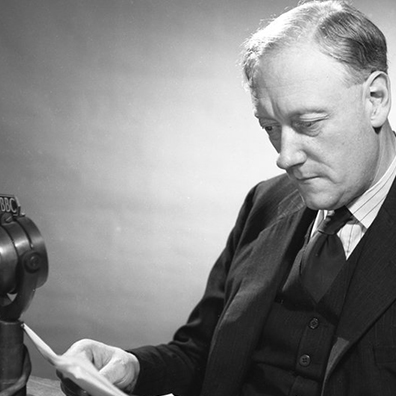
English as a language for the layabout
We as English speakers can be forgiven for thinking our language to be one of history’s greatest developments. Although I am sure that both the French and the billion-plus speakers of Mandarin Chinese might slightly disagree, by all measures English is an astonishingly efficient engine of communication around the world.
Spoken by millions as a primary language, and untold numbers as a second language, its status as the world’s lingua franca is reflected in nearly every aspect of modern life: Science, culture, the arts, transportation, and of course business all have their paths smoothed by English. This does not mean that English is the only game in town—nor should we wish it to be—but if you are stuck on a train platform in a remote corner of the globe, then English is a pretty good first try. Like a sturdy plow horse, English is built for work and plenty of it.
With the exception perhaps of French, English words are unique in that they like to hang out with words that begin with the same letter and have similar meanings. Maybe it is because they have sat together for so long in the dictionary that the affinity that bonds them is infinitely strong. Sure they will be deployed to go out and do their duty in a sentence, but they then like to hurry back home.
Like a group of lifelong friends, an A word holds a slight, but noticeable, preference for other words that begin with an A. An O word, ever so subtly, looks around for other words have an O at the front. Take any letter in the alphabet. One can hit or hammer and tease or taunt. One can stroll or scurry or scramble or scamper. Life can be dreary, damp, depressing, despondent, and drab. Affection, attraction, and amorous can soon skip from the innocence of the letter A to the more risqué neighborhood of the S words such as sensuous or sex before moving onto the sleazy, even scandalous, with words such as sybaritic and satyr.

Similar words
seem to congregate
Of course, words of a certain letter are not always joined at the hip. The beauty of the tens of thousands of English words is that they mix and match so well with all the others—as if our language is a large and constant family reunion. Yet just like at any family reunion, words have their favorite relatives and will huddle together and plan with them on how best to get a thought across. “What is in a word?” we often ask. Perhaps we should really ponder “What is in the letter that starts that word?”
Remember all the ways how we learned what words were doing? Our teachers, with their natural English teacher strictness, sonorously and often soporifically (at least in our opinion as students), spoke of synonyms, antonyms, homophones, and cognates. They described, much to our torment, the stylistic devices of assonance, consonance, and alliteration.
Yet in my stupor, it was alliteration that was my classroom salvation. It would stir me from my slumber as I learned I could make time pass quickly by coming up with examples myself. Silly of course and certainly not worthy of the Nobel Prize for literature, but alliteration proved a most agreeable way to kill time. Lord Talkalot’s boorish behavior at the banquet bred bad blood. I dread this class as it leaves me dull, drilled, dreary, and dreaming of dozing in Denmark. Yes sophomoric I know, but as an errant youth actually paying attention was low on my list of things to do.
If schoolboy alliteration is not your thing, then perhaps canines are. I have a friend who once had a dog named Scrappy. Scrappy had an astonishing assortment of barks all artfully arranged around the letter A. There was the bark of anguish should you have stepped on her paw, a bark of announcement if a guest were entering the house. Naturally, there was a bark of alert if an unknown person was near. There were barks of accommodation for welcoming, approbation to show disapproval, ambivalence when she did not care about going to the door to greet someone, and of course barks of action. Other barks in the repertoire were reserved for attack, alarm, assent, appetite, appreciation, and even arbitration when the children were fighting and she felt she needed to intervene. All these proved to be useful tools for the poor pooch—all without ever having to enter the territory of the letter B.
The real treasure of English however, is in its mischievous side—a side that is the complete opposite of its majesty as the driver of the world’s commerce and progress.
For while English lends the tools to those get-up-early types who are out to seize the day, it also plays a practical joke of paying high tribute to being just plain lazy.
Of course, it camouflages this tribute by giving the necessary words to the ambitious, the diligent, and those of perseverance and zeal. We can see that the very adjectives used to describe these high-achievers are spread out all over the dictionary. It is as if these words perfectly befit the sheer energy of the persons they are serving to describe.
Let’s look though at how English plays the joke on these great and good of society by looking at the honor roll of the indolent.
First, we have the S words such as slack off, sack out, snooze, slumber, and of course sleep. We do this in order to fulfill the mission of those R words such as restore, rejuvenate, relax, rest, refresh, repose, and recline. Why? All so that we may be in fine fettle to better re-engage with the world.
Yet for the true idler the letter L remains the first among equals. L lies near the middle of the alphabet and so one must not journey far to reach it—why expend more energy than you need to? It is as if the L words have politely herded themselves together and here we find the lodestars of life in words such as languid, leisurely, lounging, loafing, lethargy, layabout, lackadaisical, lazy, lassitude, and lolling about, Even the French and German weigh in with lentement and langsam—both meaning slowly. For those of us who cannot keep pace in life, these words are music to our ears as the remind us of much time spent in productive idleness. Speaking of idleness, L has many relatives over in the letter I with inertness, indolence, and inactivity.
Not buying this idea of English as the language for the layabout? Well, who better to defend this idea than Sir Winston Churchill? Winnie played second fiddle to no one when it came to a mastery of English and it is he who used its robust phrasing to pay homage to lounging. The eminent British historian Paul Johnson, while still an undergraduate at Oxford, once asked Churchill what the secret of his success was. “Conservation of energy” Churchill shot back. “Never stand when you can sit, and never sit when you can lie down!”
It is difficult to argue with Churchill and I can imagine him mulling over even more of those beloved L words such as laze, lag, linger, and loiter. Yes go-getters, English is your tool of advancement, but please remember it is also an oasis for those of us who are not so energetic.
Stay average!
![]()







Sir, you ignored the letter, “Q,” which I thought quixotic. Not to be querulous of course.
Sir, as you are a logophile, I am interested in your opinion. You imply that English is rich in its offerings in part due to the willingness of the language to adopt words from other languages. This allows us to reach unabashedly for those just-so words such as poltergeist, schadenfreude, and bon voyage. Our Gallic friends, on the other hand, established l’Académie française (an early member being that rapscallion Richelieu) precisely to maintain the purity of the French language. Which approach, in your mind, serves the respective language best, and why?
Sir: I will admit that the fact that I did not quarry the Q words is indeed quirky. Next time I will rustle myself from my quietude, set aside my recording of Quadrophenia, and move a little quicker. That should quell the wish to see this area of the alphabet explored!
Fitz,
I find that one of the remarkable aspects of English is its extensibility. It seems to be able to take words from other languages and within a short time find useful employment for them. It would probably take a linguist such as John McWhorter or one of his colleagues to explain why English is so structurally set up to do this, but it is indisputable that it has a remarkable capacity to seamlessly plug and play words.
I say “works” as I know some other languages, while powerful in their own right, struggle to integrate these words quite as readily. Not that they cannot of course, but I think of what is known as “Denglish.” This is Deutsch-English in which the German grabs on to English words and tries to make them fit. The result, as demonstrated to me quite a few times, is a frustrating mash–one just screams out to speak one or the other but not the mixture.
We all know the maxim about languages not being static and fortunately we do not try to corral English to keep it in a pen and free from outside influence–quite the opposite in that we let it breath. Granted I think both of us would appreciate a bit more rigor with grammar, but in its acceptance of new words, both foreign and domestic, it is unbridled.
I appreciate in many ways what the l’Académie français does. It serves to protect that incredible gift the French people of the French language–a true patrimone if there were ever one. It serves to prevent that “Denglish” that I mentioned above and works very hard, as you know, to keep a bit of continuity and purity in the spoken and written word.
On the other hand, it does fight rather a rear-guard action at times. I remember when they were trying to decide (this is a number of years ago granted) what word they would use for email. Well…that horse is rather out of the barn is it not?
Somewhere is the right balance and maybe at some point English will bump up against a limit of what it can integrate. But in the meantime it seems to be doing so very well and is holding its own. I know there is some scholarship extant regarding how the primacy of English is not a certainty, but for the moment it is one of the best communicative tools in the toolbox!